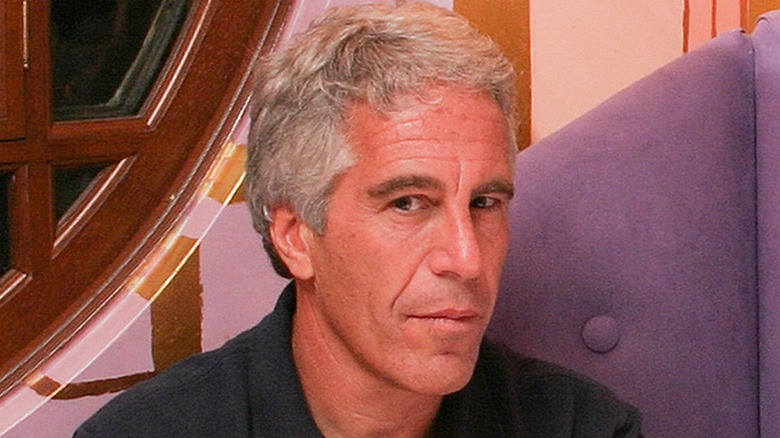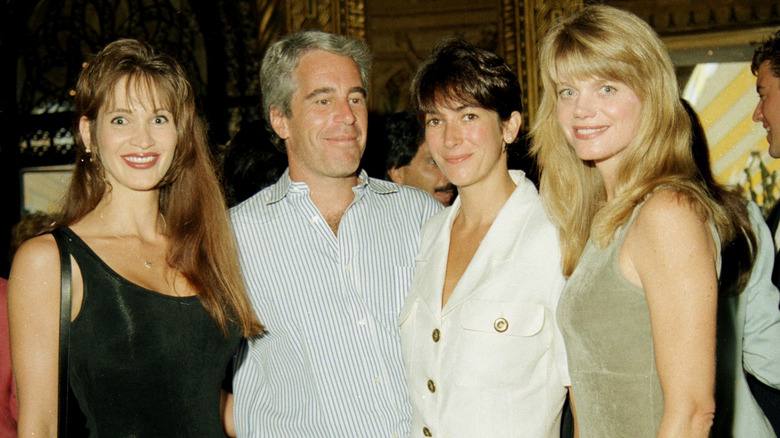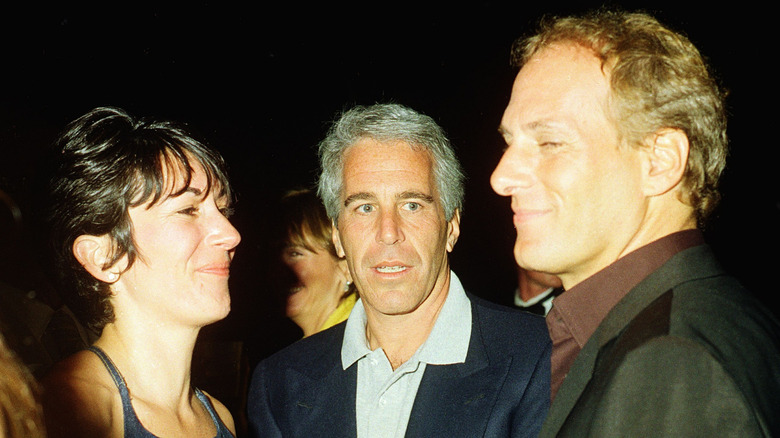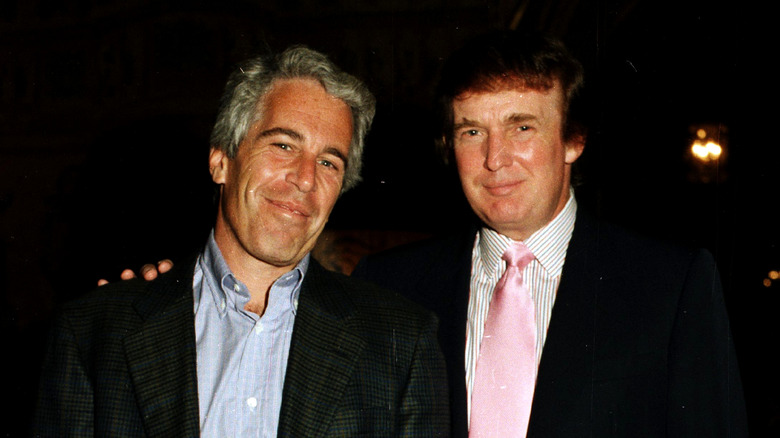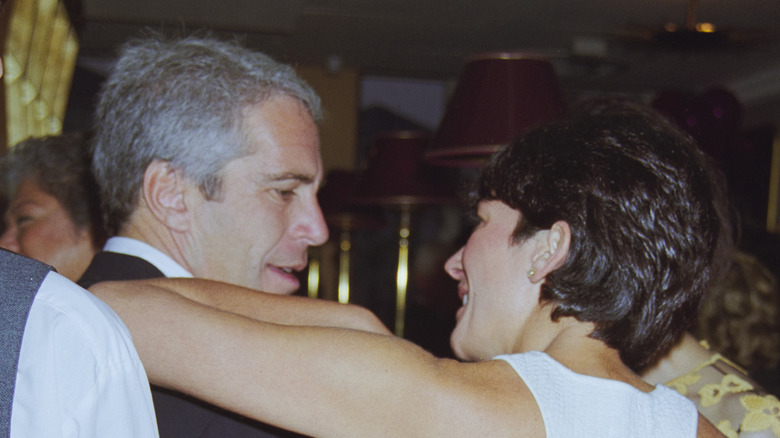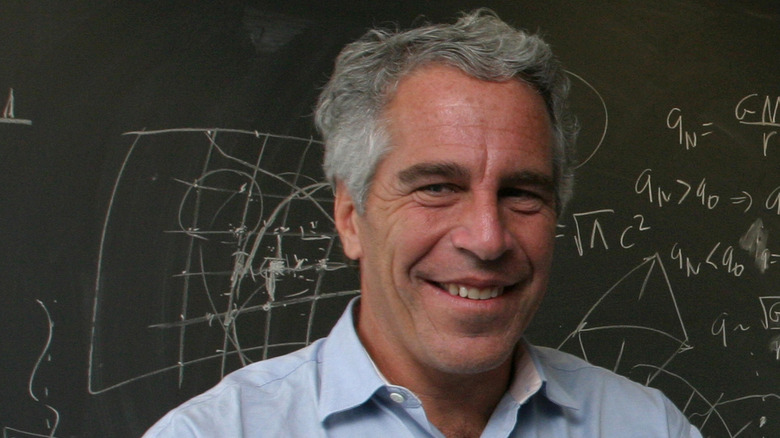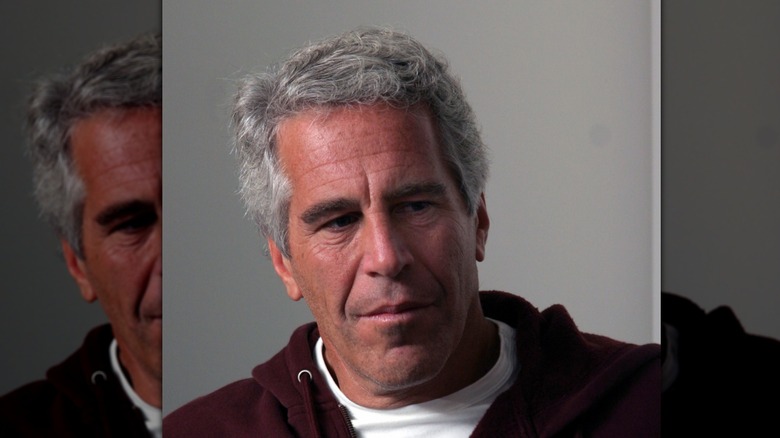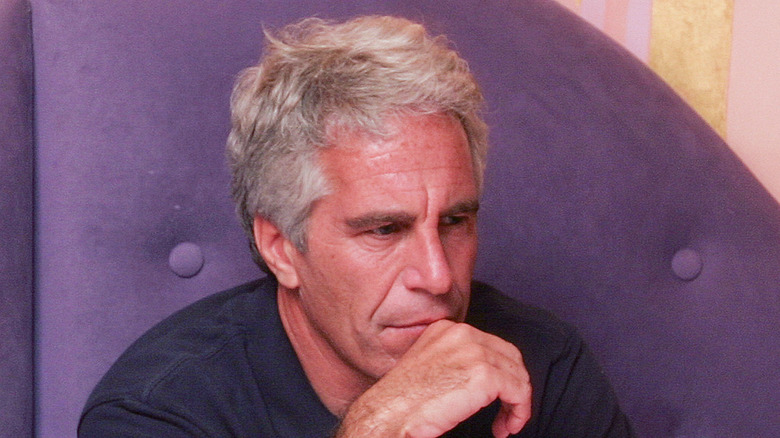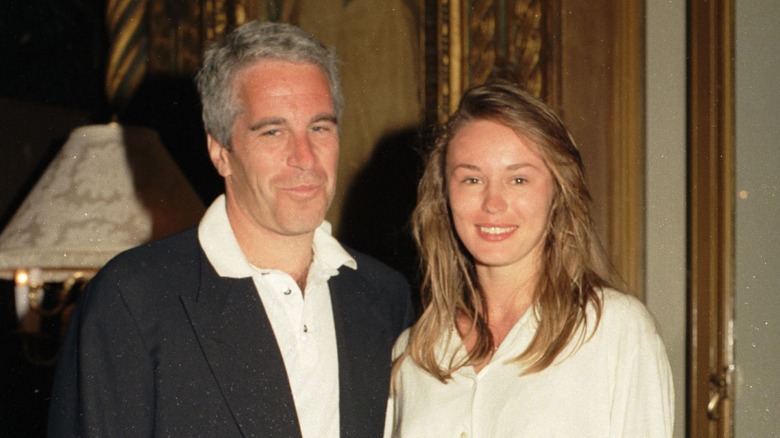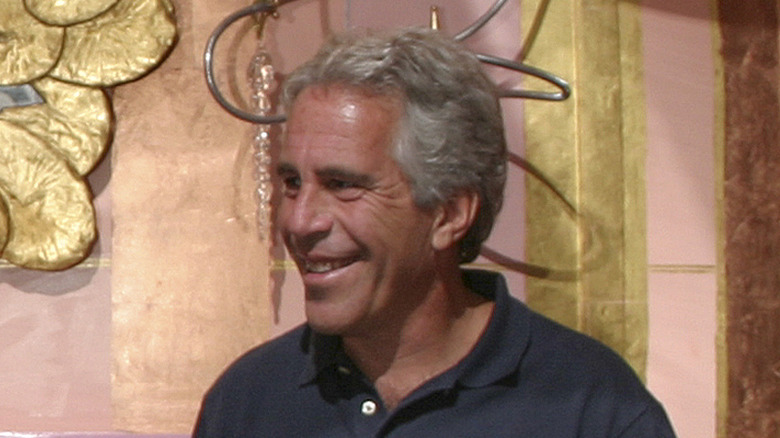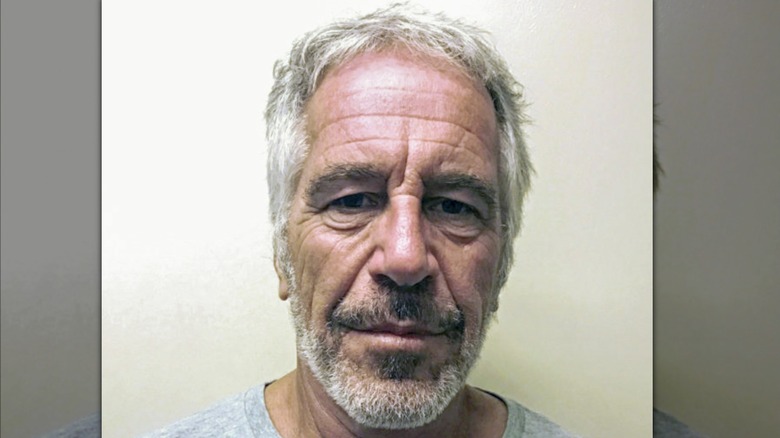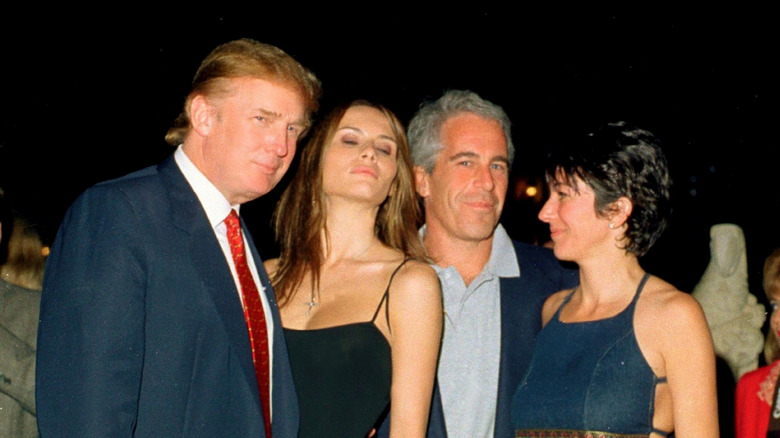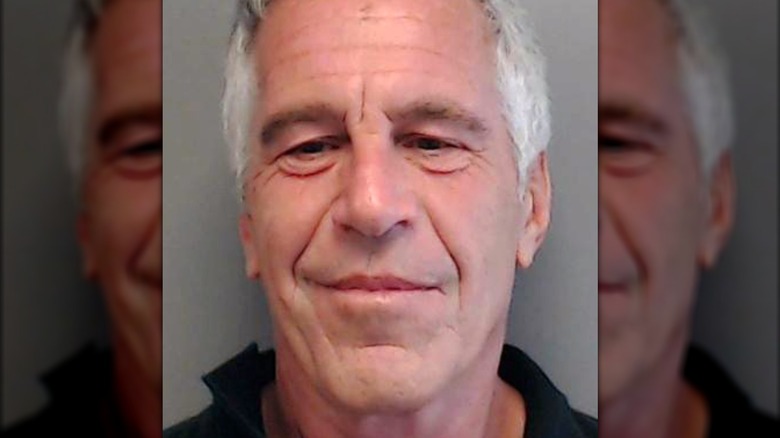Strange Things Everyone Ignored About Jeffrey Epstein
The following article includes allegations of sexual assault and child abuse.
Jeffrey Epstein proved to be one of the worst criminals of his time, but his various illicit sex acts continued for decades before federal investigators caught on to his nefarious lifestyle. His celebrity-studded lifestyle saw him fraternizing with the likes of Bill Clinton, Donald Trump, and Prince Andrew. Several of them have been accused of engaging in sexual abuse as well, incidents which allegedly occurred on two of Epstein's former private islands.
Allegedly, more than one hundred women are said to have come out against Epstein over the years, but it wouldn't be until 2019 that he faced a federal indictment. The former financier was charged with one count of sex trafficking of minors and one count of conspiracy to engage in sex trafficking of minors, but he committed suicide in a prison awaiting his trial that year.
Despite his grandeur lifestyle and attendance at some of New York City's most exclusive parties, much of Epstein's life remains a mystery. His former long-term partner Ghislaine Maxwell was sentenced to 20 years in prison in 2022 after being found guilty of several sex trafficking charges for Epstein, and she has long tried to convince the public of her innocence. Lengthy depositions and revelations continue to surface about Epstein long after his death, as the mystery of his life remains a tangled web of wealth and power placed in the wrong hands. We're breaking down all the strange things that everyone ignored about Epstein.
Jeffrey Epstein was incredibly secretive with his finances
One of the great mysteries surrounding Jeffrey Epstein is how the former financial businessman acquired such a vast fortune, and where it went after his death. The sex offender never earned a college degree, yet rose to the top of the ranks of millionaires, working with the world's most well-known financial institutions. In 1974, Epstein was hired as a math teacher at the prestigious prep school, the Dalton School, and worked there for a few years before he got fired for his lackluster performance.
It was through his teaching at the New York school that Epstein began tutoring the son of Bear Stearns CEO Alan Greenberg and later began working at the investment bank before its collapse in 2008. Epstein's contacts grew while at Bear Stearns, where he managed billionaire clients such as Les Wexner — the CEO of the company that formerly owned Victoria's Secret — as well as Apollo Global Management Chairman Leon Black. Both clients paid the former financier hundreds of millions of dollars to manage their tax portfolios as well as personal expenditures.
After Epstein's suicide in 2019, questions began swirling about where his financial holdings went and who would have access to the money. As reported by The Guardian, the former multi-millionaire signed over his fortune of nearly $600 million into a private trust, which financial experts explained makes it difficult for victims to achieve restitution.
He reportedly only accepted billionaire clients
Jeffrey Epstein ran in tight circles of influential people with even more influential pockets. Epstein's seemingly untouchable skills were supposedly so grand that he allegedly refused clients if they weren't rich enough for his liking; he reportedly declined potential clients unable to produce at least $1 billion in investments. While Les Wexner and Leon Black are known former clients of Epstein's, many of his clients went unreported due to the secrecy surrounding his business dealings. "When I asked Jeffrey who else he worked with, he'd say, 'I can't talk about it,'" a former friend of Epstein's recounted to Vanity Fair.
The multi-millionaire may have built a fortune, but his reputation was tarnished when his business partners cut ties with him. Wexner stopped working with Epstein in 2007 and later spoke about his relationship with him following his death in 2019. "Being taken advantage of by someone who was so sick, so cunning, so depraved is something that I'm embarrassed that I was even close to," he said at the time.
Epstein reportedly misappropriated nearly $50 million of Wexner's funds (which he later transferred back to the CEO's charity fund), but it wasn't until the sex offender faced federal charges that Wexner spoke publicly about Epstein's wrongdoings. His decision to remain silent for over a decade could relate to Wexner's alleged involvement in Epstein's sex schemes. Court documents (via The Columbus Dispatch) released in 2024 indicate that one victim claimed she engaged in sex acts with the CEO while he worked with Epstein.
Powerful people commented on Epstein's preference for younger women
Much was said about Jeffrey Epstein's preference for younger girls, but very few consequences were given to the man that left so many women with haunting nightmares. Epstein was often seen with Donald Trump at parties at Mar-a-Lago in the early 2000s, and the future president even spoke publicly about the former financial advisor's taste in women.
"I've known Jeff for 15 years. Terrific guy," Trump told New York Magazine in 2002. "He's a lot of fun to be with. It is even said that he likes beautiful women as much as I do, and many of them are on the younger side."
Epstein even made some shocking comments of his own far before his sexual abuse was ever made public. Hundreds of court documents that were previously sealed were revealed in 2023 and show just how candid the disgraced investment banker got with several of his groomed victims. As reported by the Independent, Johanna Sjoberg testified in court that Epstein told her "that [Bill] Clinton likes them young, referring to girls." The former president was asked for a comment by Juan Mendoza Diaz on his connection to Epstein again in 2022 to which he laughingly replied: "I think the evidence is clear."
J.P. Morgan overlooked his constant large cash withdrawals
Jeffrey Epstein was able to withdraw staggering amounts of funds for his illicit activities while bank giants were none the wiser on where the money went. In the early 2000s, Epstein was among many uber-wealthy clients of the J.P. Morgan Chase & Co. bank, but he didn't exactly adhere to the bank's policy that discouraged investors from making large cash withdrawals.
Court documents (via Insider) revealed the former businessman started taking out thousands in cash from his account in 2006, at times withdrawing up to $40,000 several times a month. Epstein would reportedly cover his tracks by tying the withdrawals to his private jet account, taking out nearly $100,000 in one transaction that occurred in 2013. Overall, he was able to take out over $5 million in cash in ten years, much of which was allegedly used to fund his sex trafficking schemes. As per various accounts made by his victims, Epstein would often pay for sexual favors in cash.
J.P. Morgan ultimately paid a $75 million settlement in a lawsuit brought by the U.S. Virgin Islands after the bank was accused of allowing Epstein to continue his exploits. In a statement, the bank wrote that it "regrets any association with [Epstein], and would never have continued doing business with him if it believed he was using the bank in any way to commit heinous crimes." The U.S. Virgin Islands dedicated $10 million of the lump sum to go towards financing mental health services for Epstein's victims.
He struck a plea deal in 2008 after abusing minors
Jeffrey Epstein was convicted of sex crimes in 2008, but it would be years before he would stop his trafficking scheme. According to the Associated Press, a federal investigation was launched into Epstein's crimes at the time, ultimately leading to a state-based plea deal. The former financier pleaded guilty to two state charges of solicitation of prostitution of a minor and solicitation of prostitution. His guilty plea was a result of a deal with the U.S. attorney's office that allowed him to evade federal charges in exchange for 18 months of jail time, spending the majority of that time in a work-release negotiation that allowed him to leave jail during the day and return at night.
The decision was a slap in the face to many of Epstein's victims, some of whom were as young as 15 at the time of his abuse. One survivor, Courtney Wild, appealed the decision, claiming it violated her rights under the Crime Victim Rights Act due to her not knowing about the negotiation. However, the appeals court upheld the ruling, saying that the victim's rights were not violated due to no federal charges being filed in the first place.
Attorneys for Wild criticized the decision, saying in a statement: "It allows wealthy and powerful defendants (like Epstein) to orchestrate special deals without crime victims having any involvement by negotiating with prosecutors before charges are ever filed. That is not something most defendants can do."
Why didn't Epstein ever marry?
One of the biggest questions surrounding Jeffrey Epstein's life is why the former mega-millionaire never married. He spent decades alongside his partner, Ghislaine Maxwell, the daughter of an incredibly wealthy British businessman who died in 1991 as his empire began to crumble over money fraud. Maxwell met Epstein through a mutual friend around the same time, and many believed she was tied to him to maintain her lavish lifestyle.
Ken Lennox, former senior photographer for the Daily Mirror, told The Guardian that she was bonded to Epstein after her father's death. "She was really devastated," he explained. "If you look through the Maxwell files, he would take her to events: Elton John's birthday, football matches. She was always there, clinging on to him. She called him 'my daddy' all the time."
While Epstein and Maxwell remained by each other's side for years, the two never tied the knot. The former investment banker never spoke publicly about his plans to marry, nor his decision to remain single, with many speculating that he was incapable of a monogamous relationship and preferred to be with women decades younger than him. Maxwell dedicated much of her time and resources to ensuring Epstein's sexual needs were met, perhaps hoping for a ring in exchange. "Ghislaine was in love with Jeffrey the way she was in love with her father," a source told Vanity Fair. "She always thought if she just did one more thing for him, to please him, he would marry her."
His private island was nicknamed 'Pedophile Island'
Jeffrey Epstein was able to participate in his various sex trafficking crimes due to his ownership of two private islands. The former businessman previously owned Great St. James and Little St. James, both islands located in the U.S. Virgin Islands. Epstein would often fly underage women to his beachfront properties where he could reportedly undergo orgies and sex acts with immense amounts of privacy and security.
It was at one of Epstein's private islands that one Jane Doe alleged she was assaulted by Prince Andrew, claiming Epstein told her to "give the Prince whatever he demanded," as per court documents obtained by the Mirror. She also claimed she was forced to participate in a large orgy on the island, and was a minor at the time of the abuse.
Survivor Virginia Giuffre — who released the smoking gun photograph of her, Ghislaine Maxwell, and Prince Andrew before he allegedly had sex with her as a minor — alleged the island was known to many by a specific nickname. "[It] was one of Jeffrey's favorite places to go because it was so isolated," she told Vanity Fair. "It has a nickname — the Pedophile Island. But that wasn't the nickname Jeffrey gave it ... But it really is Orgy Island, because that is what happened there."
He resisted answering questions about his acts with underage girls
One of the most upsetting aspects of the case against Jeffrey Epstein was his refusal to admit the alleged hundreds of sex acts he participated in with minors throughout the decades. While he accepted a plea deal in 2008 for soliciting sex from a minor, he was investigated once again in 2016 but vehemently declined to answer questions in a deposition involving a defamation lawsuit against him by Virginia Giuffre.
As reported by the Associated Press, he continued to exercise his Fifth Amendment right to questions about Ghislaine Maxwell grooming underage women for him to sexually abuse. In the Netflix documentary covering the scandal (via Vanity Fair), Epstein appears not to have a care in the world as his lawyer calls the line of questioning "argumentative" and "harassing."
During the deposition, Epstein was asked whether or not it's true that he was sent three underage non-English speaking French women, (reportedly 12 years old at the time based on Giuffre's claims). Epstein smiles when answering the question, saying, "I would like to answer that question. I really would. However, today my attorneys have told me I have to assert my Fifth Amendment, Sixth Amendment, and Fourteenth Amendment rights of the U.S. Constitution." The interrogator claimed Epstein was only trying not to self-incriminate, to which he replied: "No, in fact the Supreme Court recently said the Fifth Amendment right is there to protect the innocent. So that's the way I'd like to answer that."
His defense attorneys refused to go on record
Very few members of Jeffrey Epstein's legal team opted to go on record about their work with the former financier. Netflix's "Filthy Rich" filmmaker Lisa Bryant told Vanity Fair she exhausted all avenues in contacting every defense attorney that helped Epstein work out his 2008 plea deal, but only one ever agreed to go public about his dealings with the sex offender.
In Bryant's words, Epstein's former attorney Alan Dershowitz "was more than happy to do so." The filmmaker admitted, "We were surprised at how forthcoming he was. He said, 'I absolutely will talk about it.'" Survivor Virginia Giuffre previously identified Dershowitz as one of the men she was sexually abused by in connection to Epstein, but she later retracted her statements, saying (via CNN), "I now recognize I may have made a mistake in identifying Mr. Dershowitz."
Bryant told Vanity Fair that Dershowitz was more inclined to talk about his defense against Giuffre than his client, however. "[He] kept coming back to it," she recounted. "I said, 'Look, that is going to be part of our story, but we're not there yet. Let's talk about the steps of the deal.' But he kept wanting to talk about his defense of himself," she admitted.
His inner circle helped finance years of sexual abuse
Jeffrey Epstein continued his sexual abuse for far too long, largely due to his inner circle of millionaire friends that allowed the activities to continue. Epstein was notorious for allegedly donating large heaps of funds towards prestigious educational institutions such as Harvard, often inviting elite scholars to his numerous social events to rub shoulders with them. In exchange for looking the other way, many believe his peers continued to reap the benefits from his immense cash flow.
Despite his 2008 guilty plea, J.P. Morgan continued to keep Epstein as a client due to the power of his influence. As reported by The New Yorker, the bank allegedly valued the former investment banker's ability to bring more business and investments their way. Though the bank stopped doing business with Epstein in 2013, it was only until after he died in 2019 that representatives for J.P. Morgan alerted the Treasury Department to more than $1 billion of transactions relating to sex trafficking, according to CNBC.
Epstein's vast connections to Wall Street's elite as well as the royal family and former presidents proved a difficult web to untangle for many of his associates. Many are still untangling from the giant fallout of his downfall, and some have met even graver fate. Epstein's former business partner, Jean-Luc Brunel, was found hanging in his prison cell in 2022 after committing suicide awaiting trial for accusations of rape of minors and trafficking of minors.
No one knows how much Epstein was worth
With such a vast fortune to his name, the media started to wonder just how much Jeffrey Epstein's former empire was worth and where exactly the money was going following his death. Much of his wealth originated from his business relationship with CEO Lex Wexner, but with the two severing ties in 2007, a lot of speculation exists about how Epstein was able to keep up his millionaire lifestyle.
His Palm Beach property, islands, private jets, New Mexico ranch, and Manhattan mansion were reported to be worth around $600 million, according to The New York Times. That grand fortune has since diminished to a reported $185 million after multiple lawsuits and victim restitution funds tapped into his assets. The exact location of other properties Epstein owned, including one in Paris, has yet to be released by federal prosecutors and therefore appraisals are subject to change.
Many of Epstein's business dealings remain a mystery, as the man who was once proclaimed to be a billionaire may not have been one at all. Forbes called Epstein out nearly a decade before his federal indictment, writing a 2010 blog titled, "Sex Offender Jeffrey Epstein Is Not a Billionaire," and claiming that his money-management firm based in the U.S. Virgin Islands "generates no public records, nor has his client list ever been released."
The theories surrounding his death
Jeffrey Epstein's death was ruled a suicide after officials found him hanging in his jail cell awaiting trial. Reports have detailed strange nuances involving his death, however, leading some to think he was murdered. As The New Yorker reported, the guards in charge of checking on Epstein every 30 minutes reportedly fell asleep on watch, leading his final moments to remain a mystery. Epstein was also required to have a cellmate, but that order fell by the wayside.
Epstein's lawyer, Martin Weinberg, claimed (via the Independent) an expert found that his injuries were much more consistent with a murder than a suicide. Jail records obtained by Vice News (via Forbes) indicated that Epstein unsuccessfully attempted to take his life days before his death, but reportedly told a jail psychologist that he "would be crazy" to commit suicide. Conspiracy theorists claim that the disgraced former financier was murdered, a claim upheld by forensic pathologist Cyril Wecht. In the Netflix docuseries "Filthy Rich" (via Vanity Fair), he said, "There was no evidence at all to indicate that [Epstein] had jumped or leaped from his bunk [bed]."
Wecht explained that there were three fractures of the hyoid bone found in Epstein's autopsy, but claimed, "You do not get [those injuries] with a suicidal hanging of someone leaning forward ... I would say to have these three fractures in a suicidal hanging would be extremely rare." Ghislaine Maxwell seconded that claim, telling Britain's TalkTv (via The Economic Times), "I believe that he was murdered."
If you or anyone you know may be the victim of sexual assault or child abuse, contact the relevant resources below:
- Visit the Rape, Abuse & Incest National Network website or contact RAINN's National Helpline at 1-800-656-HOPE (4673).
- Contact the Childhelp National Child Abuse Hotline at 1-800-4-A-Child (1-800-422-4453) or contact their live chat services.

